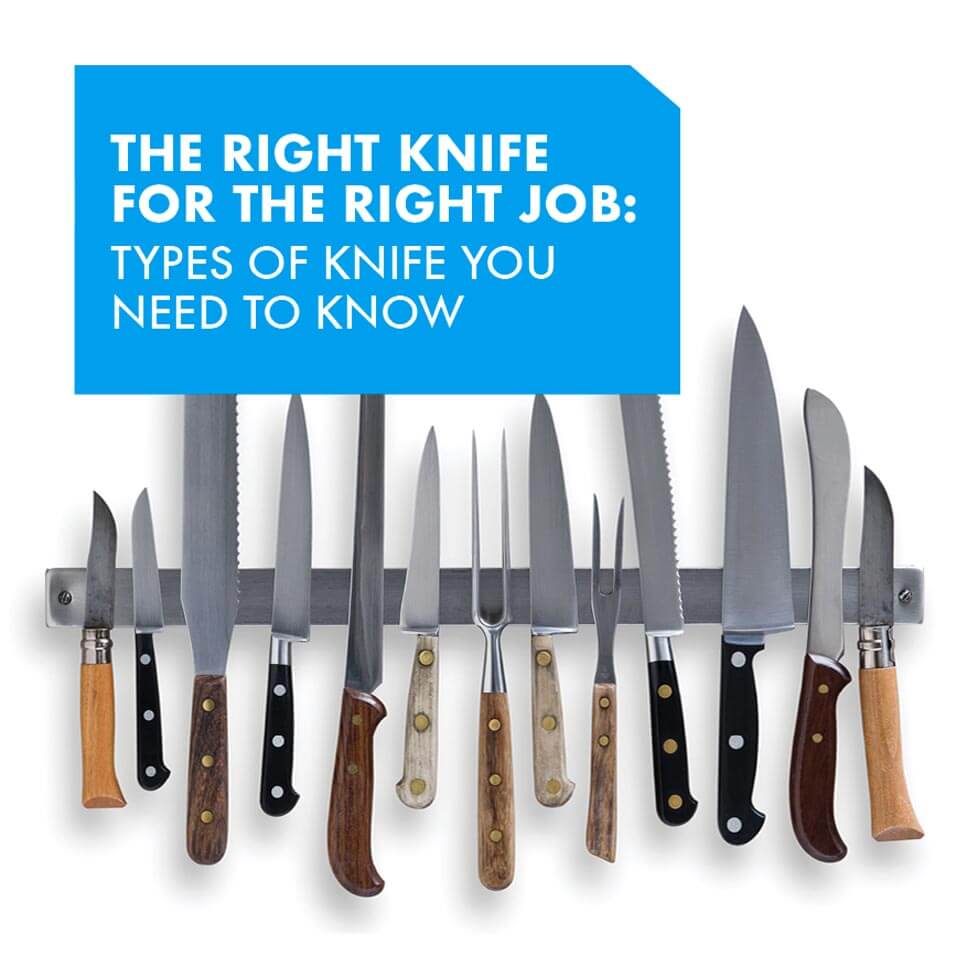
The Right Knife for The Right Job: Types of Knife You Need to Know
When you start choosing for that perfect chef’s knife—one that will make slicing, dicing, chopping, and mincing more pleasurable, precise, and effortless—it’s important to identify your personal preferences.
With so many knives to choose from, it can be difficult to know where to start with creating your personal knife collection. So, whether you’re starting in catering and want to know which knives to invest in, or simply want to kit out your kitchen at home, this guide will tell you everything you need to know. These are the most essential and frequently used types of kitchen knife:
- Chef knife
The chef’s knife is a must-have all-rounder in any kitchen; it chops, slices, crushes and carves! It’s designed to perform well at a range of tasks. A chef knife — sometimes called a chef’s or cook’s knife — has a long, broad blade with a straight edge.
- Carving knife
This knife has a long, slim knife, tapering to a sharp point. This knife also known as slicing knife; a carving knife is one of the longest kitchen knives in the kitchen. Its narrow width means that it produces less drag as it cuts through food, allowing it to create cleaner, more uniform slices.
- Filleting knife
A filleting knife is a long, slim knife with a flexible blade. The slim, flexible blade is perfect for removing bones without damaging the delicate flesh of the fish. They differ from other knives in that they’re often used to cut through food horizontally, rather than vertically — this allows chefs to cut around the backbone of whole fish to create perfect fillets.
- Pastry knife
These look a bit like bread knives but they’re usually longer and have a rounded end. They are used to cleanly cut through sponge and trim cakes in preparation for icing.
- Cleaver or butcher knife
They come in a variety of sizes, depending on their intended use. A cleaver is the only kitchen knife that cuts through bone, and is primarily used for preparing meat. The blade doesn’t need to be particularly sharp as it’s the weight of the cleaver and the way it’s swung (like a hammer) that make it cut right through.
This is just a few examples, there are still more different knifes you need to know. Beside types of knifes, if you want to be serious working in the kitchen you need to have broad knowledge about management in the kitchen; it includes all aspects, from operational, cost-control to human resources. They must work together and.
If you find that hard to start on your own, then SGU International Culinary Business is the right place to start. SGU International Culinary Business will be suitable for those who really want to focus on building a career as a culinary entrepreneur.
Given that SGU International Culinary Business has several practical courses, we continue to make sure the learning process continues during the pandemic. Students can still take practical classes during the pandemic through a hybrid plan system which is a combination of online and offline. This offline class can be followed without coercion, students who live in the Jakarta and Tangerang areas are encouraged to attend practicum as long as they have received permission from their parents. In addition, because the practicum course is conducted offline, SGU International Culinary Business also adheres to class protocols and requirements such as the number of certain students in one meeting, as regulated by SGU Gugus Tugas Covid-19 Team.
SGU offers accredited degrees with international exposure in Switzerland through our partner university (International Management Institute Switzerland). Our partnership with prominent associations (Association of Culinary Professionals, PT Langgeng Makmur Kencana, and others) within the culinary industry also allow our students to learn directly from industry professionals.
SGU is the first and only to offer a double degree program in Culinary Business in Indonesia. Through this program, every student is required to go to Switzerland and study at the International Management Institute.
The program consists of culinary courses taught by experienced SGU lecturers in Indonesia and world class European culinary courses in Switzerland. You will continue to expand your skills and knowledge towards advanced skills. In the final semesters, you will be equipped with entrepreneurial skills to be future owners / operators in the culinary industry.
Speaking of internships, every SGU International Culinary Business student will be required to take part in two internships: in Indonesia and abroad. In their first internship in Indonesia, students will be usually directed to hot kitchens (a kitchen that supports the use of heat in cooking all sorts of ingredients, whether by boiling, steaming, frying, stir-frying, stewing or roasting, etc.). In the second internship, they will usually be directed to take the cold kitchens (a kitchen that supports cooking processes that do not require heat).
These two internship programs are of course formed so that students can gain advanced culinary skills. Those who really want to be chefs or entrepreneurs can be more focused. Students will also be further nurtured through the 5 Days Culinary Preneur program, an additional program special for International Culinary Business students that allows them to make a culinary business plan with experienced mentors.
SGU International Culinary Business graduates will be equipped with the knowledge and skills needed to succeed in managerial positions within the culinary industry, in addition to potential owners of future culinary establishments. The following are some career prospects for those of you who study International Culinary Business at SGU:
- Chef Owner (Restaurant, Café, Bakery, etc.)
- Professional Chef
- Culinary Consultant
- Food Stylist
- Catering Services
- Cruise Staff
Tentang SGU
SWISS GERMAN UNIVERSITY (SGU) is an international university in Indonesia, was established in 2000 as a joint effort between Indonesia, Germany, Switzerland, and Austria. We are the pioneer in offering international curricula in Indonesia. Qualified students can graduate with a Double Degree from Indonesia and Germany, which SGU provides in cooperation with partner universities; surely a valuable tool for your future careers. Ever since its establishment, SGU has been dedicated to delivering quality education in line with international standards and aims to develop skilled professionals who meet the demands of the industry. In order to achieve its objectives, SGU offers quality-oriented learning through 12 Bachelor’s Degree Programs and 4 Master’s Degree Programs ranging from Engineering, Information Technology, and Business to Life Sciences and Social Sciences. Furthermore, with small class sizes, and with English as the medium of instruction, you can look forward to pursuing your tertiary education and degree with full confidence.
Curriculum Back
